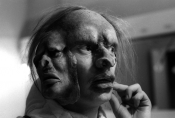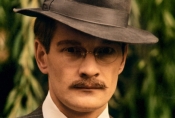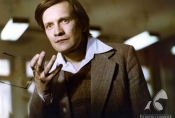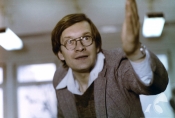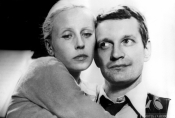Andrzej Seweryn
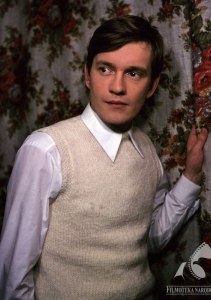
“This profession cannot be defined. Intellect does not guarantee success in acting. Often, on the contrary, it is an obstacle. It is a profession full of contradictions. Is it not a mystery that the audience goes silent when one actor enters the stage and does not even see when another one appears?” he stated in an interview in 1993. Seventeen years later, in 2010, he added, "All right, I can be a ‘perfectionist,’ a ‘conservative,’ or a ‘liberal.’ Whatever you prefer. Much more important is to feel that what I'm doing has some meaning.”
He was born on April 25, 1946 in Heilbronn, Germany. He is a graduate of the Acting Department of the State Higher School of Theatre in Warsaw (1968). After graduation, he joined the Ateneum Theatre (1968-1980) and then moved to France, where he worked for Comédie-Française. Since 2011, he has been the director of the Polski Theatre in Warsaw.
He first appeared on screen in the cameo role of a student in Beata (1964) by Anna Sokołowska. His first major role, in Album polski [Polish album] (1970) by Jan Rybkowski, brought him great popularity. Four years later, Andrzej Wajda cast him in the role of Max Baum in Ziemia obiecana/The Promised Land (1974), a spectacular take on the novel by Władysław Reymont. It is the story of three friends who set out to earn their fortunes in nineteenth century Łódź. “There are three heroes, one of whom is Polish (Daniel Olbrychski), another – German (Andrzej Seweryn), and the third – a Jew (Wojciech Pszoniak). Yet they do not let these differences come between them. Together, they set up a factory. They share a common interest, a shared sense of class identity,” says Wajda. After the premiere, the trio of actors were dubbed the “Three Musketeers of Polish cinema.”
Ziemia obiecana/The Promised Land marked the beginning of Seweryn’s collaboration with Wajda. It was in Wajda’s films that Seweryn gave his greatest performances, including the police officer in Człowiek z żelaza/Man of Iron (1981), Bourdon in Danton (1982), the Judge in Pan Tadeusz (1999), and Regent Milczek in the film adaptation of Fredro's comedy Zemsta/Revenge (2002). His performance as the young, ambitious orchestra conductor from a provincial town in Dyrygent/The Conductor (1979) was a true masterpiece. In the film, a young Polish woman, a violinist on a scholarship in the United States, meets a world-renowned conductor who was once in love with ... her mother. Now, the maestro is going to visit his old haunts. He comes to the town of his birth. There, together with the local orchestra – usually conducted by the violinist’s husband – he will perform Beethoven's Fifth Symphony. For this role the actor won the Silver Bear award at the Berlin Festival (1980).
The role of Max in Ziemia obiecana/The Promised Land was the first in a series of highly interesting performances by Seweryn in films based on popular novels. These are some of the best: Anzelm Ostrzeński in Noce i dnie/Nights and Days (1975) by Jerzy Antczak, Zenon Ziembiewicz in Granica/The Border (1977) by Jan Rybkowski, Marek in – unfortunately the unfinished – Na srebrnym globie/On the Silver Globe (1987) by Andrzej Żuławski, and Duke Jeremi Michał Wiśniowiecki in Ogniem i Mieczem/With Fire and Sword (1999) by Jerzy Hoffman. Also interesting was his double role as Primate Stefan Wyszyński and his doppelganger in Teresa Kotlarczyk’s Prymas. Trzy lata z tysiąca/The Primate (2000).
Seweryn had many good roles in contemporary films – Dyrygent/The Conductor is the most prominent example, but also notable were: Marek in Kung Fu (1979) by Janusz Kijowski; the renowned writer called Adam Warczewski who is spied on by the young woman he falls for in Różyczka (2010) by Jan Kidawa-Błoński; or the cynical president of in Uwikłanie/Entanglement (2011) by Jacek Bromski, loosely based on the crime novel by Zygmunt Miłoszewski.
In 2006, the actor made his directorial debut with Kto nigdy nie żył…/Who Never Lived... taking up the difficult subject of the moral dilemmas that a young priest faces when he learns that he is HIV positive. Seweryn played the supporting role of the head doctor.
In 2012, he received – along with Daniel Olbrychski and Wojciech Pszoniak - the Polish Cinema Lifetime Achievement Award, with particular emphasis on their outstanding performances in Ziemia Obiecana/The Promised Land.
Selected filmography
-
1974
THE PROMISED LAND
reż. Andrzej Wajda
-
1981
MAN OF IRON
reż. Andrzej Wajda
